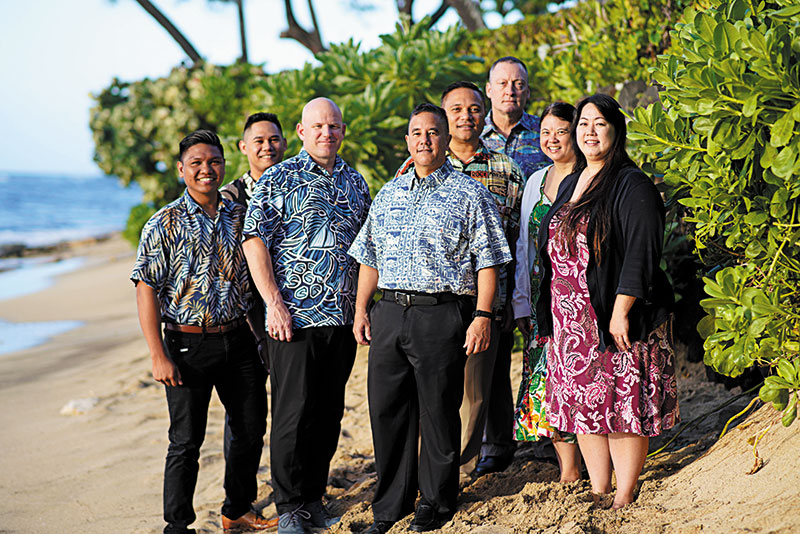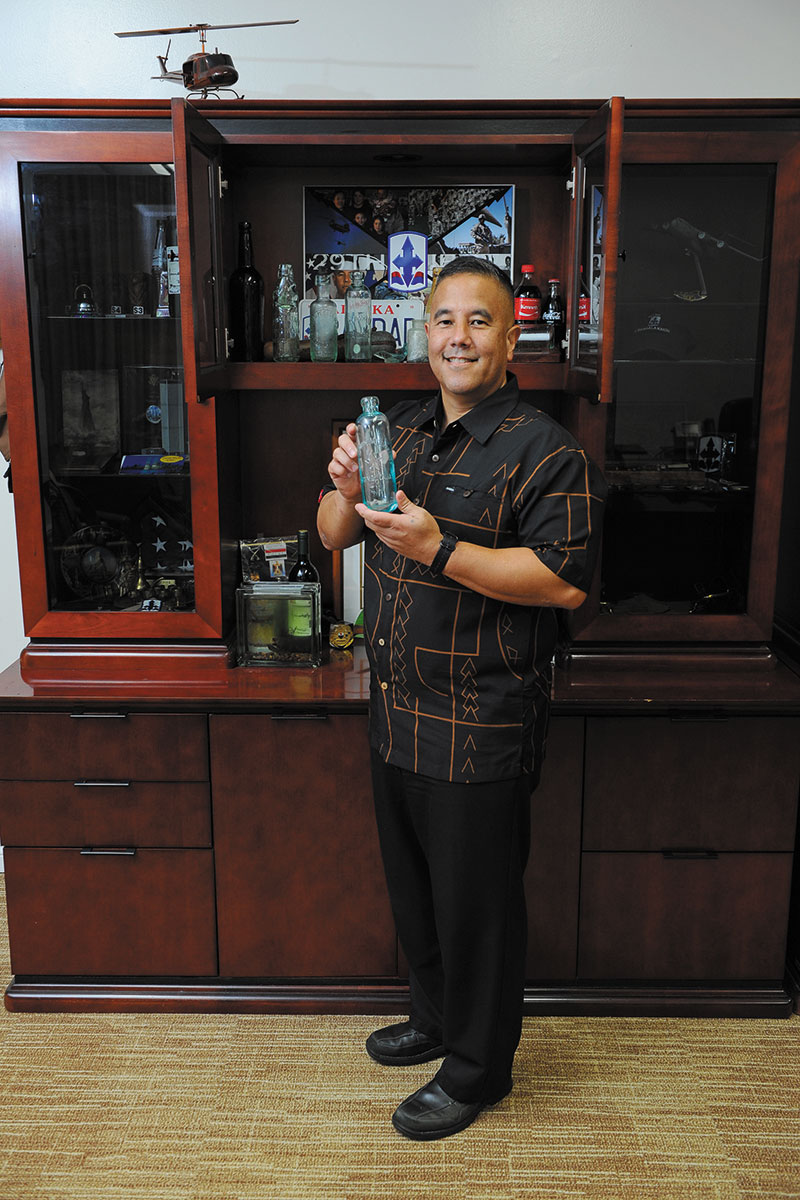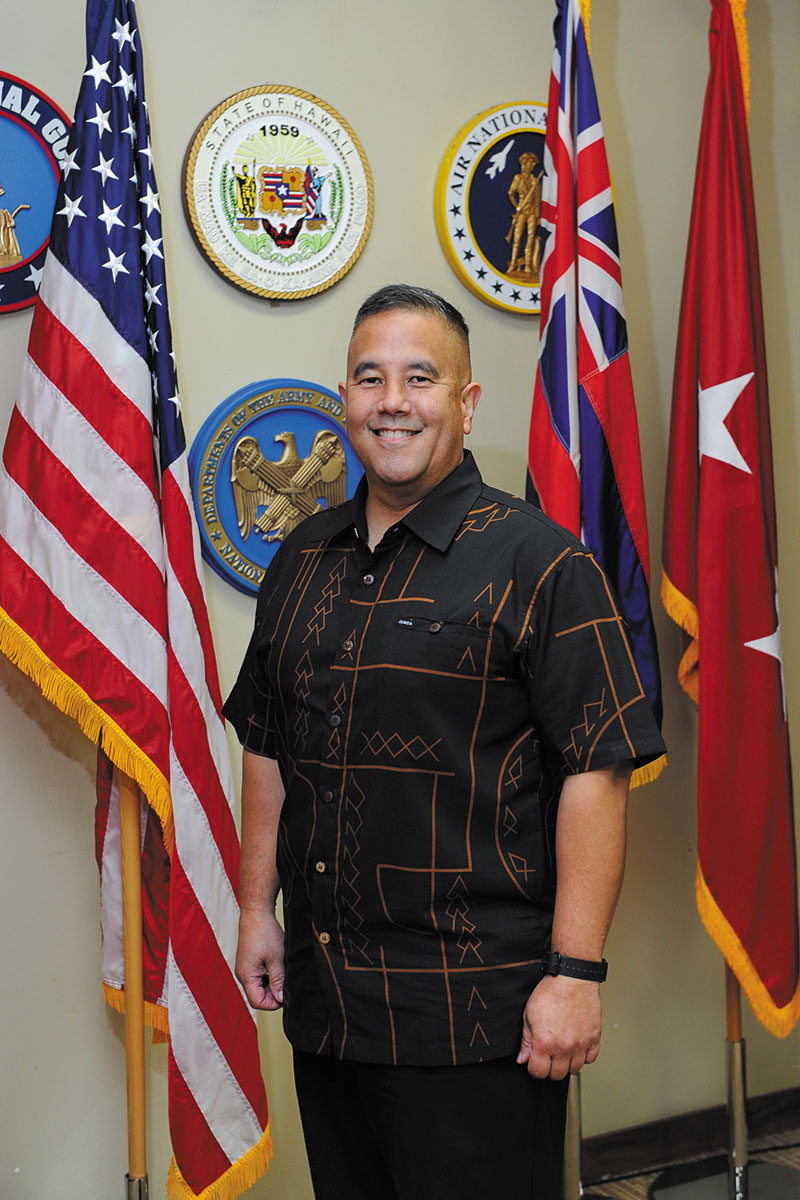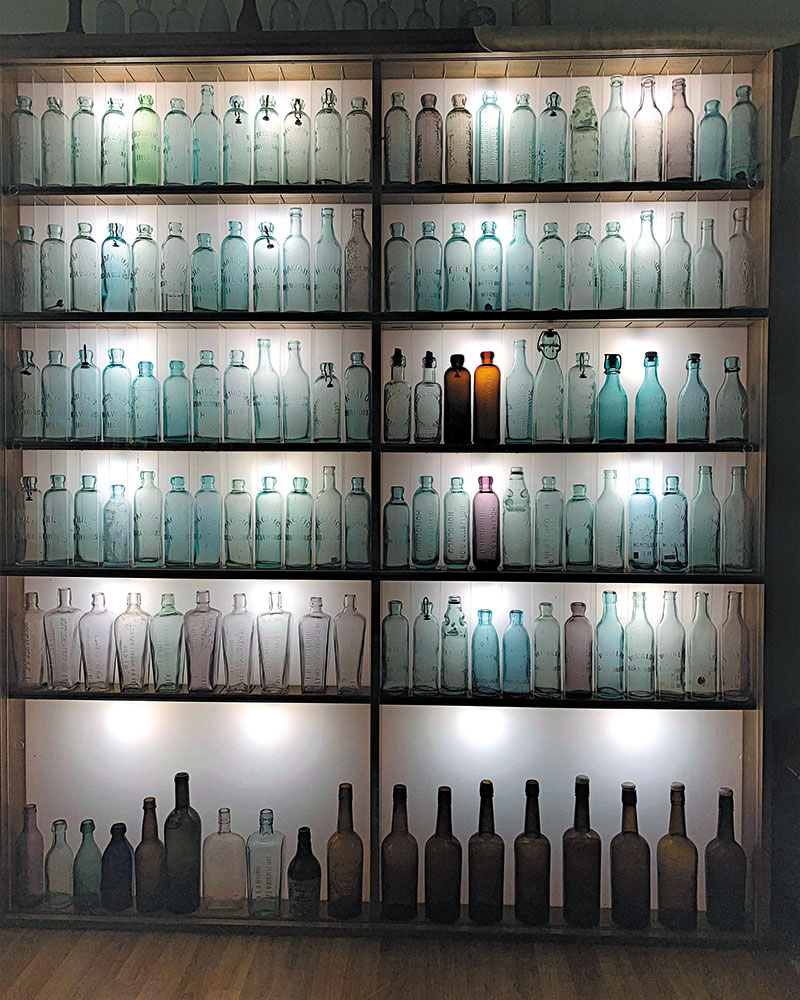The Greatest Challenge of My Life…by Far
One day after graduating from Waiākea High School in 1984, Kenneth Hara found himself trading hoops with a classmate and contemplating his life and future. He loved to fish, surf and play football, having suited up as a split back for then-Warriors coach (and former Hawai‘i county mayor) Harry Kim, but he was looking for another activity to be passionate about.
That’s when his Hilo classmate provided him with a bit of unexpected bait.
“We had just finished playing basketball and he asked if I wanted to go digging for bottles,” remembers Hara.“I was like, ‘What? No!’ But he explained that some of the bottles are worth hundreds and hundreds of dollars.”
The financial reward for what Hara believed was an odd pastime suddenly piqued his interest. As he recalls, “We weren’t doing anything anyway. So the first time we went out, I found a pretty good bottle worth $200.
“After that, I was hooked.”
Hara remains an avid gatherer of old Hawai‘i bottles — be they of the medicine, soda, and whiskey or gin variety — and boasts an impressive glass collection that dates as far back as the late 1800s. It features items he either traded for or uncovered in gullies, at dumpsites and within abandoned plantation camps on the Big Island.

Since the pandemic began in March, Maj. Gen. Kenneth Hara, the state’s COVID-19 incident commander, and his staff have spent many long days and weeks working and sleeping at their Diamond Head office. Here they are during a pre-pandemic photo op: (front row, from left) Spec. Aldrich Bagaosan, driver; CSM Dana Wingad, command senior enlisted leader; Hara; and Nancy Buffett, personal secretary to the adjutant general; (middle row) Spec. Gavin Ching, administrative assistant; Lt. Col. Troy Cullen, executive officer to the adjutant general; Moina Lum, personal secretary to the adjutant general; (back row) and Col. Stephen Logan, deputy adjutant general.
PHOTO COURTESY HAWAII DEPARTMENT OF DEFENSE
A month ago, he was thrilled to find an early 1900s Hutchinson soda bottle known for its unique shape and patented spring-loaded wire stopper. It was his first “Hutch” unearthed in nearly 14 years, and yet such rare discoveries haven’t lessened his passion for what Hara still calls “my primary hobby.”
Neither has his enthusiasm waned for serving his country. Around the same time that Hara discovered a love for bottle collecting, he decided to join Hawai‘i Army National Guard — and thank goodness for that.
Today, Maj. Gen. Kenneth Hara wears a number of important hats that impact countless lives. As adjutant general for the state of Hawai‘i, his role is essentially threefold: to serve as commander of Hawai‘i National Guard, and director of both Hawai‘i Emergency Management Agency (more commonly known as HI-EMA) and Office of Homeland Security.
By any measure, this breadth of responsibility would be considered overwhelming to most. But back in March, Hara took on additional duties after Gov. David Ige appointed him to be the state’s COVID-19 incident commander — a move that placed Hara and his team at the center of Hawai‘i’s emergency response to the pandemic.
Fortunately, life in the military prepared him — a decorated officer who served three deployments to Baghdad, Iraq; Kuwait; and Kandahar, Afghanistan — for all types of disasters.

Hara keeps a few of the rare bottles he’s collected since 1984 at his Diamond Head office. LAWRENCE TABUDLO PHOTO
“Ken’s a remarkable person,” observes Gov. Ige. “He’s very strategic in his thinking, he’s very thorough and he’s someone who you can count on, absolutely.
“So (he) was the perfect person to serve as incident commander.”
Despite the high praise for his qualifications, Hara admits the obvious when it comes to dealing with the current health crisis.
“This has been the greatest challenge of my life … by far,” he states candidly.
Among the critical duties Hara and the Hawai‘i Army and Air National Guard Joint Task Force have been charged with are distributing medical supplies (which include personal protective equipment), performing coronavirus testing on residents, supporting Department of Health contact tracing efforts, and screening passengers at state airports.
Even the recent rollout of vaccinations has been conducted under his watch. (As of Christmas Eve, the state had ordered 21,450 and 17,800 doses of the Pfizer and Moderna vaccines, respectively, and Hara estimates about 15,000 shots had been administered to essential workers up until then.)
In many ways, Hara views his role as more of an “orchestrator of operational planning” rather than someone who is “directing everything.” He commends the leadership of others, including health director Dr. Libby Char and Lt. Gov. Josh Green, and praises the efforts of Col. Stephen Logan, who is helping to shoulder the load as deputy adjutant general for the state’s Department of Defense.
“Everybody has a role,” explains Hara. “Obviously, the Department of Health has the biggest role in trying to mitigate this pandemic.”
He continues: “We’ve tried to work closely with everyone, coordinating with all the different departments, federal agencies, the nonprofits, the private sector, the state Legislature. I think we’ve been pretty successful.
“Hawai‘i is still the best in the nation when it comes to overall CDC numbers for infections and positivity rates. I think we’re No. 2 as far as death per 100,000. So when you look at all those metrics, Hawai‘i is doing the best.”
Despite the positive strides made across the state, Hara claims there is still much to do in defeating the virus — particularly when it comes to curbing super-spreader situations through large social gatherings.
“The reason why we’re not 100 percent successful is people are not following safe practices and guidelines,” he says. “We have to do the three simple things we often talk about — wear a mask, wash your hands, watch your distance. Unless everyone follows that, we’re not going to beat this disease.”
If anything, Hara and his team have proven quite resilient in their commitment to the coronavirus battle.
“When the pandemic first started, I was living in my office seven days a week and literally getting two to four hours of sleep each night for about three or four months,” he says. “As the virus (cases) slowed down a bit, I went back home on the weekends. But when we had the first big surge, I started hunkering down again seven days a week with my whole crew, and we would just stay in a bubble.
“Now I’m back to a good seven hours of sleep — unless something critical happens.”
He credits wife Myoung with holding down the fort at the couple’s Mililani residence while he’s “deployed” at his Diamond Head office.
“She has the hardest job for sure,” admits Hara, who shares three children with Myoung and two from a previous marriage. “When I came back from my first deployment, I took three days of leave and told her, ‘Let me give you a break. I’ll get the kids ready, take them to school, pick them up and take them to their sports and different activities.’”
But after the first week, Hara experienced a change of heart.
“I told her, ‘I’m done. I’m going back to work,’” he says, laughing. “I mean I would rather have been shot at than continue doing those things.”
The fact that Hara is even in the military is somewhat of a surprise in itself. Up until the time he graduated from high school, most had assumed he would not be following in the family’s rich tradition of military service.
His father, Henry, was a retired lieutenant colonel and commander of the 2nd Battalion, 299th Infantry in Hilo, while an uncle retired as a colonel. Even Hara’s three older brothers — most notably Gary, who became the U.S. Army Pacific’s Deputy Commanding General-NationalGuard — all served honorably for many years.
But Hara chose to keep his feelings for future service bottled up, in large part because he did not want to disappoint mother Janet, who was determined not to lose her youngest child to the military.
“She’d tell my dad, ‘You’re not-taking my baby — no way,’” Hara recalls. “So my dad never pushed me.”
Still, Hara knew as early as age 5 that he wanted to be in the National Guard; his dream, in fact, was to become a helicopter pilot. Finally, when he was 17, he informed his father of his plans.
“My dad was a real crusty guy who rarely smiled; I mean his nickname in the Guard was ‘The Shogun,’” notes Hara. “So when I told him I was going to join the Guard, his face just lit up. You could see how happy he was that I was going to serve.”
Happy, too, have been the people of Hawai‘i, who have discovered Hara to be the right man for any emergency.








